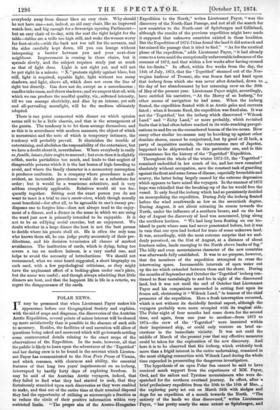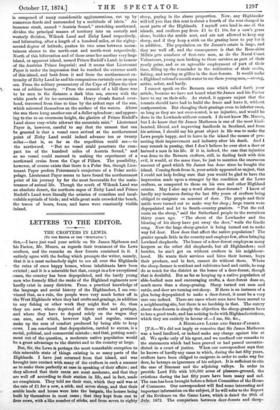POLAR NEWS.
IT may be presumed that when Lieutenant Payer makes his • appearance before our Geographical Society and explains, with the aid of maps and diagrams, the discoveries of the Austrian Arctic Expedition, several points of minor interest will be cleared up more satisfactorily than is possible in the absence of such aids to accuracy. Besides, the facilities of oral narration will allow of questions being asked and answered which will go towards settling some controverted details relating to the exact scope of the observations of the Expedition. In the main, however, all that the public is likely to learn upon the adventures of the Tegetthof ' and her daring crew is to be found in the account which Lieuten- ant Payer has communicated to the Nene Freie Presse of Vienna, and which resumes, with clearness and ability, the essential features of that long two years' imprisonment on an iceberg, interrupted by hardly forty days of exploring freedom. It may be said of the Austrian Arctic voyagers, indeed, that they failed to find what they had started to seek, that they fortuitously stumbled upon such discoveries as they were enabled to make, and that out of the entire time at their nominal disposal they had the opportunity of utilising so microscopic a fraction as to reduce the circle of their positive information within very restricted limits. "The proper aim of the Austro-Hungarian Expedition to the North," writes Lieutenant Payer, "was the discovery of the North-East Passage, and not at all the search for new countries to the North-east of Spitzbergen and Gillisland, although the results of the previous expedition might have made it supposed that unknown countries existed in these localities. But the Expedition of 1872-74 has found theland it did notseek and has missed the passage that it tried to find." "As for the nautical phase of the expedition," adds Lieutenant Payer, " it had already come to a term amid the exceptionally unfavourable influences of the summer of 1872, and that within a few weeks after having crossed the ice-limits." In effect, within five weeks from the day, the 14th of July, 1872, that the Tegetthof ' steamed out of the Nor- wegian harbour of Tromso, she was frozen fast and bard upon that iceberg from which she was never after detached, down to the day of her abandonment by her returning crew on the 20th of May of the present year. Lieutenant Payer might, accordingly, have entitled his narrative, "At the Mercy of an Iceberg," for other means of navigation he had none. When the iceberg floated, the expedition floated with it as Arctic gales and currents listed ; when it became fixed, the expedition was fixed also. It was not the Tegetthof,' but the iceberg which discovered " Wilczek Land" and " Zichy Land," or more probably, which revisited limits that it had often before reached in its wide-reaching peregri- nations to and fro on the encumbered bosom of the ice-ocean. How many other similar ice-masses may be knocking up against other desolate shores, cannot be conjectured, but by good or ill luck, a party of inquisitive mortals, the venturesome race of Japetus, happened to be shipwrecked on this particular one, and in this circumstance lies the history of the Tegetthof ' Expedition.
Throughout the whole of the winter 1872-73, the ' Tegetthof ' remained embedded in her couch of ice, and her crew remained absolutely without occupation, save the constant task of guarding against the frost and some forms of disease, especially bronchitis and scurvy, the latter being largely caused by the extreme depression which appears to have seized the voyagers. In the summer of 1873 hope was rekindled that the breaking-up of the ice would free the vessel. It only freed the iceberg which had so persistently decided on monopolising the expedition. During July the iceberg floated before the wind southwards as low as the seventieth degree. During August, it set about retracing its course towards the North, under the influence of a southern breeze, and on the last day of August the discovery of land was announced, lying along the northern horizon. " We had long been floating on our ice- island in parts where man hid never penetrated before, but it was in vain that our eyes had looked for trace of some unknown land. It was, accordingly, with the most extreme surprise that we sud- denly perceived, on the 31st of August, at a distance of about fourteen miles, lands emerging to the North above banks of fog." The hilly and even mountainous character of the new countries was afterwards fully established. It was to no purpose, however, that the members of the expedition attempted to cross the intervening space. Innumerable intervals of open water cut up the ice which extended between them and the shore. During the months of September and October the Tegetthof ' iceberg con- tinued to float tantalisingly to and fro in sight of the discovered land, but it was not until the end of October that Lieutenant Payer and his companions succeeded in setting foot upon its frozen soil, christening it " Wilczek Land," in honour of the chief promoter of the expedition. Here a fresh interruption occurred, which is not without its decidedly farcical aspect, although the voyagers probably were more occupied with its tragical side. The Polar night of four months had come down for the second time, and again, from one year to another—from 1873 to 1874—the crew of the ' Tegetthof ' were immured within their imprisoned ship, or could only venture on brief ex- cursions in the immediate vicinity. It was not until the middle of March of the present year that any effective measures could be taken for the exploration of the new discovery. And here it is to be observed that the iceberg, which evidently took more than a frigid interest in the entire undertaking, remained in the most obliging connection with Wilczek Land during the whole time expended in prosecuting the dangerous investigation.
The hypothesis of an open Polar Sea cannot be said to have received much support from the experiences of MM. Payer, Orel, and the sailors and Tyrolese mountaineers who were de- spatched for the northern overland journey. In effect, after a brief preliminary expedition from the 10th to the 16th of Mark _, the exploring party set out on March 24th with sledges and dogs for an expedition of a month towards the North. "The entirety of the lands we thus discovered," writes Lieutenant Payer, " has pretty nearly the same extent as Spitzbergen, and
is composed of many considerable agglomerations, cut up by numerous fiords and surrounded by a multitude of islets." An immense strait, named " Austria Sound," stretching-northward, *divides the principal masses of territory into an easterly and -westerly division, Wilczek Land and Zichy Land respectively, and bifurcating, after a length of a hundred miles, at the eighty- second degree of latitude, pushes its two arms between moun- tainous shores to the north-east and north-west respectively. North of this bifurcation and of these arms lies another very large island, or apparent island, named Prince Rudolf's Land, in honour .of the Austrian Prince Imperial; and it seems that Lieutenant Payer is under the impression that he reached the extreme north of this island, and both from it and from the northernmost ex- tremity of Zichy Land he and his companions certainly saw an open sea. From the solitary promontory of the Cape of Pillars the view was of sublime beauty. " From the summit of a hill there was to be seen in the distance a dark blue sea, strewn with the -white pearls of its ice-mountains. Heavy clouds floated over- head, traversed from time to time by the ardent rays of the sun, which mirrored themselves on the surface of the waters. Above the sun there hung another sun of a duller splendour ; and appear- ing to rise to an enormous height, the glaciers of Prince Rudolf's Land shone rosy-white athwart the mountain mist." Lieutenant Payer is, however, careful to say that the utmost that can be granted is that a vessel once arrived at the northernmost point of Zichy Land could indeed advance ten or twenty miles—that is, so far as the expedition could see—to the northward. " But no vessel could penetrate the com- pact ice of the hundred miles of Austria Sound," and -so no vessel could succeed in making the experiment of a northward cruise from the Cape of Pillars. The possibility, however, of course exists that there is a Polar Sea, though Lieu- tenant Payer prefers Petermann's conjecture of a Polar archi- pelago. Lieutenant Payer seems to have found the northernmost point of his journey by far the most favourable for the main- tenance of animal life. Though the south of Wilczek Land was an absolute desert, the northern capes of Zichy Land and Prince Rudolf's Land were literally the aviaries of countless and incal- .culable myriads of birds; and while great seals crowded the beach, the traces of bears, foxes, and hares were constantly visible inland.



































 Previous page
Previous page